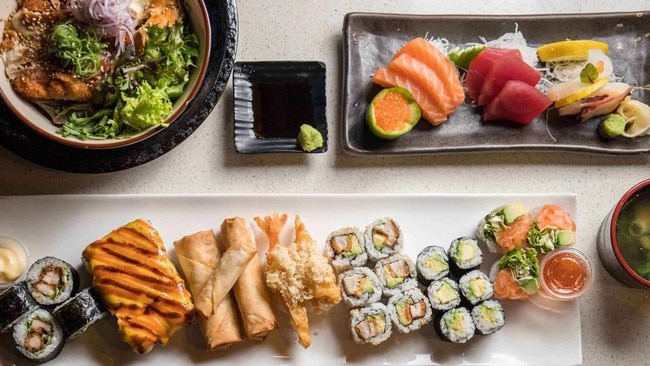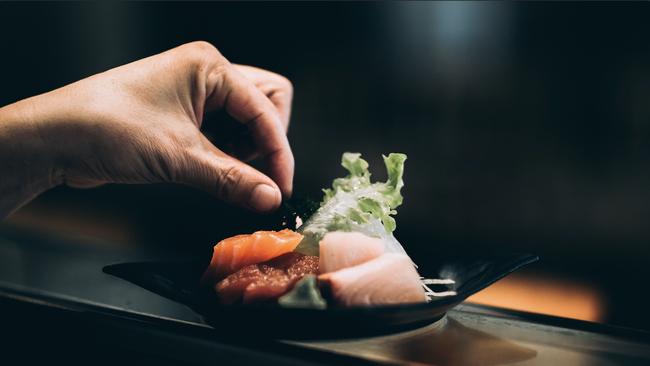Disgraced national restaurant chain’s debt snowballs to more than $21m
The debts of a disgraced national restaurant chain that collapsed have snowballed past the $21 million mark as authorities take action.
Retail
Don't miss out on the headlines from Retail. Followed categories will be added to My News.
EXCLUSIVE
The debts of a disgraced Japanese restaurant chain that collapsed last year have snowballed past the $21 million mark.
News.com.au previously reported that the Sushi Bay chain, which had been operating 13 stores spanning across NSW, the ACT and the Northern Territory since 2004, had gone into liquidation.
The Deputy Commissioner of Taxation began winding-up proceedings against the Sushi Bay network over unpaid tax debts and multiple restaurants fell in quick succession.
The Fair Work Ombudsman (FWO) was also pursuing the company over breaches of the Fair Work Act, as well as personally pursuing the owner and sole director, for allegedly underpaying 163 workers — mostly Korean nationals — $650,000 over a number of years and then falsifying records to try to cover it up.
Earlier this month, the FWO secured record penalties of $15.3 million against Sushi Bay outlets.
When combining the pre-existing debts of the collapsed businesses, along with the new penalty, the Sushi Bay collapse can be seen as one of the largest in the hospitality industry in Australia, leaving a whopping $21 million hole behind.

All the stores at the once-thriving Sushi Bay chain have been closed except for an outlet at Macarthur Square, Campbelltown, in Sydney.
At its peak, the chain had a number of stores across Sydney, including in Miranda, Rhodes, Penrith, Rouse Hill, Parramatta, Carlingford, Charlestown, Glendale and Campbelltown. It also had two stores outside Sydney in Shellharbour and Forster, as well as a Canberra and Darwin store.
Christopher Palmer of insolvency firm O’Brien Palmer is the appointed liquidator of all the restaurants and has released a number of statutory reports obtained by news.com.au.
The liquidator said Sushi Bay’s sole director, Sydney woman Yi Jeong ‘Rebecca’ Shin, had been issued with a demand to repay $1.449 million due to trading while insolvent.
“I have not received a response,” Mr Palmer, wrote in an update to creditors last month.
Ms Shin might be able to afford this as she sold a property she jointly owned in the Sydney suburb of Ryde for $4.9 million in 2022.
“It appears that the director may have had capacity to pay, at least in part, a claim for insolvent trading,” Mr Palmer noted.
“The question that follows is how was the equity in the property, if any, applied by the director?”
Do you know more or have a similar story? Get in touch | alex.turner-cohen@news.com.au

A company called Raphael Shin Enterprises Pty Ltd was the holding company for the Sushi Bay businesses and has also been hit with a demand to pay back $1.449 million for insolvent trading.
It was run by the director’s husband and the liquidator deemed that Ms Shin “must have or should have kept him (her husband) informed of the financial position of the company”.
Mr Palmer also said Sushi Bay has “likely failed to comply with its obligations pursuant to Section 286 of the Act to keep and retain adequate books and records” and that he had not been able to access to the restaurant chain’s accounting software.
Ms Shin previously was the director of the Korean Daily Hoju Dong-A Pty Ltd, a daily Korean paper in the Eastwood area of Sydney. This company has since been deregistered.
News.com.au has attempted to contact Ms Shin and her husband for comment.
Sushi Bay’s flagship business, Sushi Bay Pty Ltd, owes $3.711 million to creditors, including $1.5 million to the tax office.
Then Sushi Bay’s Miranda store, in Sydney’s south, which was registered under the business name Auskobay Pty Ltd, owes $751,000 to nearly 50 creditors.
Auskoja Pty Ltd, which was trading as Sushi Bay Forster, Sushi Bay Glendale, Sushi Bay Charlestown and Hinata Charlestown, owes $758,000.
Sushi Bay NT owes $347,000, while Sushi Bay ACT owes $208,000.


The Federal Court also took action against Ms Shin and her string of businesses earlier this month by securing the $15.3 million penalty, the highest ever secured in a Fair Work Ombudsman legal action, surpassing the FWO’s $10.3 million win against the Commonwealth Bank and CommSec earlier this year.
Those fines included a $3.2 million penalty against Sushi Bay Pty Ltd, a $5.8 million penalty against Sushi Bay ACT Pty Ltd, $2.4 million against Auskobay Pty Ltd and $2.3 million against Auskoja Pty Ltd.
The Federal Court also handed down a $1.6 million fine against Ms Shin personally.
Sushi Bay underpaid mostly Korean nationals on student or other visas between February 2016 and January 2020, with underpayments ranging from $48 to $83,968, the court heard. Most them were aged under 25 and they generally worked as cooks, kitchen attendants or food and beverage attendants.
Court documents claimed, and it was upheld, that records like payslips had been falsified by recording the incorrect working hours and rates of pay for staff to conceal the underpayments.
“The creation and maintenance of these documents shows that the overwhelming majority of the contraventions were committed deliberately and intentionally,” Justice Katzmann wrote scathingly in her judgement.
Ms Shin and Sushi Bay ACT had previously drawn authorities’ ire after incurring a $124,416 penalty in 2019 for underpaying its workers at its Canberra restaurant.
As a result, these latest breaches were deemed “serious contraventions” and attracted up to 10 times the maximum penalties that would ordinarily apply.
Justice Katzmann also recommended that Ms Shin’s actions be referred to various regulators and government departments — the Australian Taxation Office, the Department of Home Affairs and the Australian Securities and Investments Commission.
alex.turner-cohen@news.com.au
Originally published as Disgraced national restaurant chain’s debt snowballs to more than $21m



